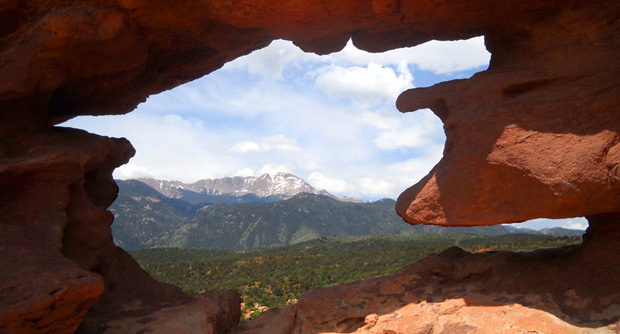Continued from
Part 1.
EVERYONE NEEDS A HOME BASE, RIGHT?
Wrong.
The "RV lifestyle" has been a big learning experience for us -- learning about ourselves, mostly,
as we've gotten increasingly immersed in it.
Even though we
frequently went
out in our camper for weekend and one- to two-week trips to foot races while
Jim was still working, the concept of full-time RVing wasn't even on our
mental radar screen when he retired seven years ago. At the time we didn't personally
know anyone who did it, nor did we know how much we'd enjoy traveling
for extended periods of time.
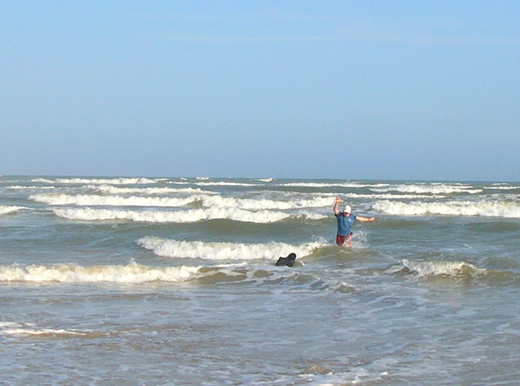
Nice place to spend a bunch of
time in the winter: Mustang Island, Texas.
Jim and Cody play in the surf,
January, 2009.
We were living in Montana then. One of our retirement
goals was to find a warmer place to live, then
sell our house.
However, we unexpectedly sold it in December when a golden
opportunity presented itself. We had only one month to decide where to go
and what to do.
Yikes! That's when we really started learning about
adaptability. What clothing should we take with us for an unknown period
of time -- and locales? What documents and financial records might we need
with us? How will we get our mail? What about internet connectivity?
Medical appointments?
There were a million things to consider, and fast.
In addition, it wasn't much fun to pack the camper with the
essentials and put our other belongings into storage during one
of the coldest months on record. The snow drifts were so high around the
camper that we almost didn't get it out of the back yard:
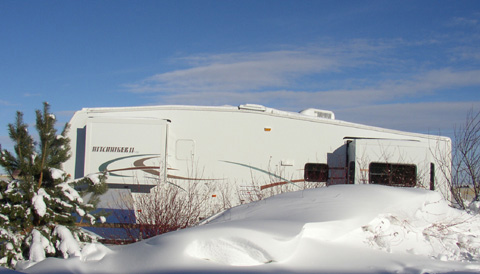
At least we already had a fairly new 5th-wheel HitchHiker II camper
at the time in
which we planned to do extended traveling, but we weren't prepared mentally to
be completely without a home base. In fact, we hadn't even considered
the possibility of living in the coach full time.
And although we'd done extensive research re: a
warmer place to live, we hadn't decided where that home base would be.
Equally exhausted from all the work and decisions we had to make, and
excited about our new adventure, we headed south in our rig to run some races.
Our
focus should have been on having fun while we didn't have a house to
worry about. But we were still in the frame of mind of needing a home
base, so that became our focus: finding a good place to retire,
hopefully our last house before needing a nursing home.
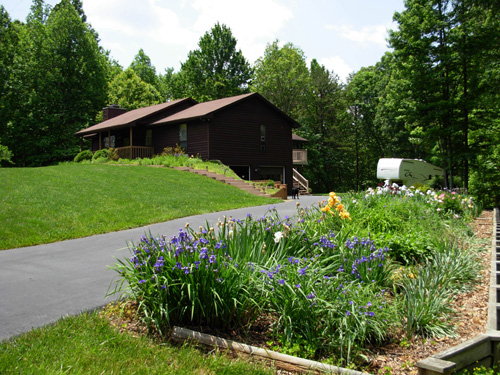
Our house in the spring when the
bearded
iris are in bloom. (May, 2007)
Five months later we bought our house and twelve acres of wooded land
near Roanoke, VA. We love it but it has become more of a
burden than retreat. The point when we realized we'd be happier
full-timing in an RV . . . about three years ago . . . unfortunately
coincided with the housing bust!
We don't want to even try to sell that property until the
housing market recovers, and that could be several more years.
Although we'd have less worry and more money without our house, we
aren't going to forfeit the equity we have tied up in it. To help us
live with that decision we rationalize that we have the best of both worlds:
we are free to travel
when and where we want, within reason, and we have a comfortable place in a
beautiful location to visit when the weather is nice in the spring and
fall.
Our current plan is to keep the house until we can recoup most or all
of our financial investment in it and enjoy extended RV trips twice a
year. Then we'll sell it and enjoy our lifestyle even more without
having to worry about our property when we're on the other side of the
country.
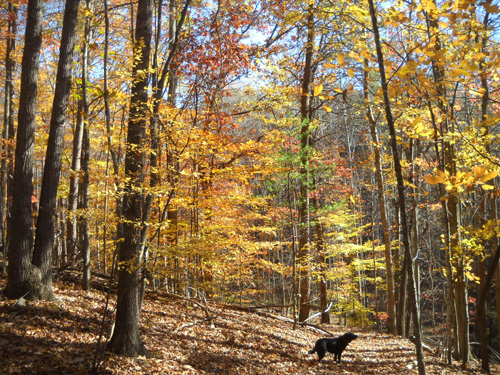
Cody leads the way on a path through
our woods. (November, 2010)
[NOTE: In another entry I'll talk about the need for
full-time RVers to either retain or establish a legal state residency,
also known as a "home base." I used the term in this section in regards
to having a house, condo, apartment, or other dwelling that is
permanently
attached to land, and venturing out from it in an RV.]
NOMADS BY CHOICE
I often joke about wondering where Jim and I got our "Gypsy genes."
No one else in our families seems to have the same sense of
curiosity and adventure that we do regarding travel, with or
without an RV.
Granted, many of them are still working, raising families, or
have other factors (medical, financial) that limit their freedom
to roam.
The older ones with that freedom, however, are more
firmly rooted in their communities than we are and don't have
the same level of wanderlust that Jim and I do.
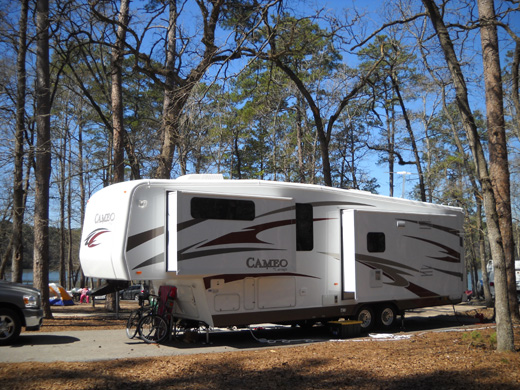
Home Sweet Home: our Cameo sits near the lake
at Huntsville State Park, TX. (February, 2010)
We're not "from" Virginia and
because we've been gone much more than we've been there since we bought
our house seven years ago, we have only weak community ties. We also
don't have any relatives within two states of there, let alone in the
Roanoke area. Our family members are currently strung across the country
from one coast to the other.
Retirees who have stronger ties to their community naturally have a
harder time selling their house and traveling full-time in an RV.
We have friends and relatives who are so involved with their friends,
kids/grandkids, local activities, and/or volunteering that they won't go
away for more than a week or two at a time.
We can understand that because it's a traditional, "conventional"
lifestyle in our society. Many people still live in their hometowns
after they retire. They are comfortable there and can't imagine leaving
unless it's to move closer to their grandchildren.
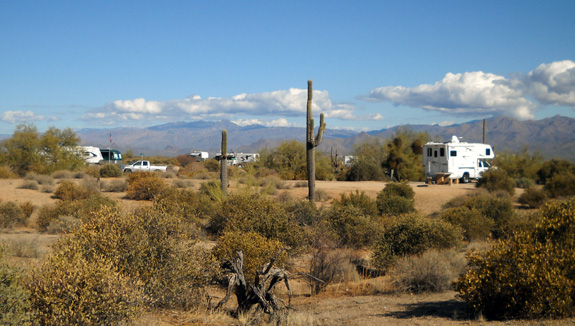
Southern Arizona deserts are popular places for RV
snowbirds in the winter.
(McDowell Mtn. Park near Phoenix)
It's also common in our country for some northern U.S. retirees to
become full- or part-time "snowbirds," relocating to warmer climes
during the winter months just like some of our feathered friends migrate
south for the winter. You've heard the
jokes about all the Yankees invading Florida over the winter, for example.
Same thing happens in southern Texas, Arizona, and other Sunbelt states,
too. More of these folks
are living in apartments,
condos, or houses than in RVs, however. (Ironically, the older couple
whose house we bought in Virginia lives in a condo in Florida at least
six months of the year.)
Jim and I are part of the growing subculture of retirees who aren't wired
like either one of these more traditional groups.
Many people don't understand how people like us can go away
in an RV for months at
a time, let alone aspire to do it full time.
Folks who require familiar surroundings and more consistency in their
lives than we do tend to fall into two
camps: those who think we're unstable and/or irresponsible, and those who
secretly wish to emulate our lifestyle!
We hear from more in the
latter category than the former.
DO WE MISS ANYTHING AT "HOME" WHEN WE'RE TRAVELING?
We've gotten this question several times from running friends and other
people who are toying with the idea of
selling their houses to become full-time or extended-travel RVers. This is how I've generally
responded:
I think the only thing Jim misses is his comfy leather lounge chair! Our house
mostly represents
work to
us and we're literally ready to be gone within about two days of returning there.
It will need painting, a new roof, and some other costly or work-intensive improvements as it ages.
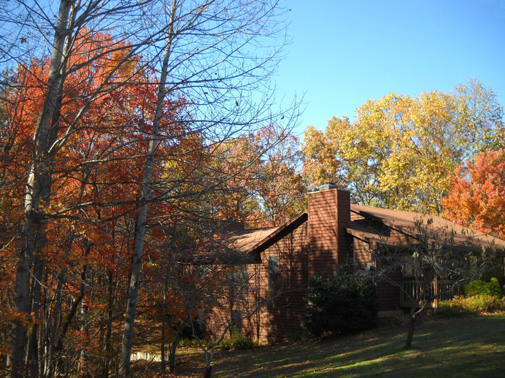
November, 2010: the leaves are gorgeous, but they
can't stay in the gutters or on the grass all winter.
Yard work is also very time-consuming when we're there, much harder
than if we could do it on a daily or weekly basis.
An older neighbor keeps an eye on our house while we're gone and mows
the yard during the summer, but we can't expect him to weed the large
perennial beds all summer or deal with all the leaves in the fall. Those
are chores Jim and I dread every September or October when we go back to
Virginia. I deal with the weeding, he deals with the leaves.
We also have to deal with fallen trees and limbs after the frequent
storms our area gets. The only benefit is the firewood they provide.
Even though the truck
and camper require maintenance and repairs on a regular basis, fixing
them is easier than all the things that we have to do with the house
and yard. The Cameo is spacious as RVs go, but it is much smaller to keep clean
than a house and much less expensive if it ever needs a new roof!
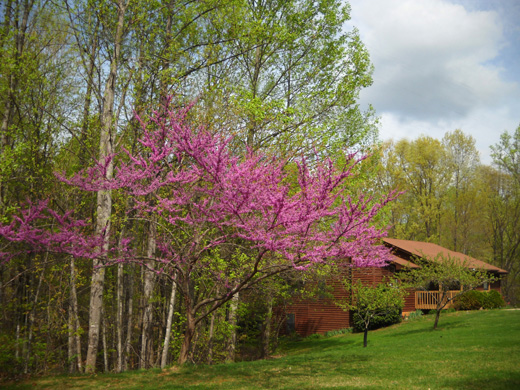
Early April, 2010: pretty redbud tree in side
yard
I have more ambivalent feelings about the house than Jim does, mostly
because I enjoy gardening and the peacefulness of our secluded forest full of beautiful hardwood trees near the Blue
Ridge Parkway and the Appalachian Trail.
But I can find that peace many other places -- and not have the
burdens of ownership. I crave adventure, traveling to new places, and
revisiting my old favorite haunts more than this house or acreage.
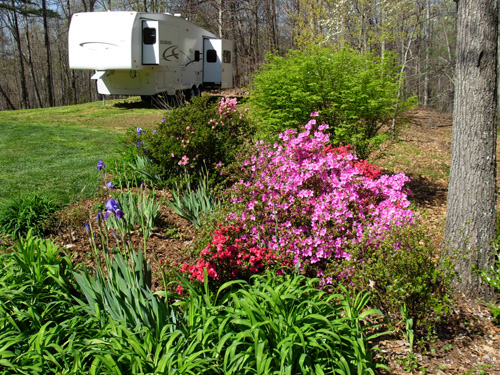
Picturesque camping spot -- in our own back yard!
It will be less stressful for both of us when we sell the house and put
all of our "keeper possessions" in storage -- the things that are
meaningful/useful that we can't haul around with us in the camper but
want to keep for when we "settle down" again, which I'm pretty sure we
will do.
Selling the house will probably be sort of like having to stop running because of my bad
knees. Instead of feeling like I lost something very important, I soon
realized not having the stress of training for and competing in races
was actually quite liberating!
So it can be when you whittle your belongings down to only the things
you really need.
WHERE/WHEN WE LIKE TO ROAM
Although we usually have a vague plan in mind about various
destinations, we often change those plans during our trips. We seldom
regret those decisions. We call it "being flexible," adapting to
changing
circumstances and our whims.
For that reason I've pretty much stopped putting our tentative plans
on this website. People think we're less flaky if I just write in the
past tense about where we've been and what we've done than if they see
an intended destination or race and then we don't go there!
One of the big advantages of extended and full-time RVing is getting
to choose where to hang out various times of the year.
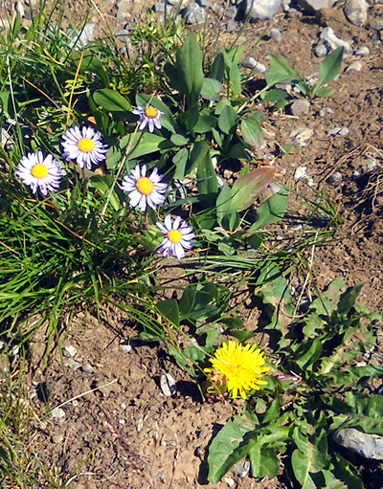
Late August in the high Tetons: a dandelion
in bloom!
After living in Illinois and Montana for 55 years Jim became a
total snow-phobe. I still like snow when I don't have to shovel it or drive
in it. We both prefer a moderate temperature range from the 40s to the
70s F. all year long. We try to live as
much as possible in what I call the
"Dandelion Time Warp" because it's like eternal spring.
Seeking that zone the past few years gives us a general travel
time frame that looks like this:
* Spring and fall are beautiful in the Roanoke area and the temps are
pretty moderate then, so we're usually there for about four weeks at a time
in April-May and October-November.
* In early May we head for the high
mountains out West, where we hunker down under flannel sheets on
chilly nights and it usually doesn't exceed 60-70°
F. in the afternoon.
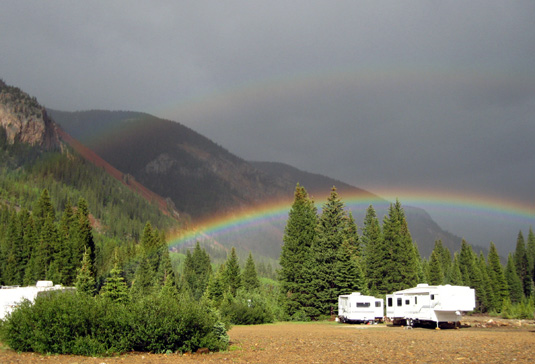
RVers enjoy a double rainbow
while boondocking on National Forest Service Land
along South Mineral Creek near
Silverton, CO, a "cool" place to camp at 9,000 feet in the summer.
* In the winter we like to head back out West, far
enough south in Arizona and Texas to avoid any snow and enjoy those same 60-70° temperatures that are the envy of most folks above the 32nd parallel.
Of course, the weather and fate haven't always cooperated.
The last two
autumns we had to remain in Roanoke a month longer than planned and didn't get out until the snow was
already flying:
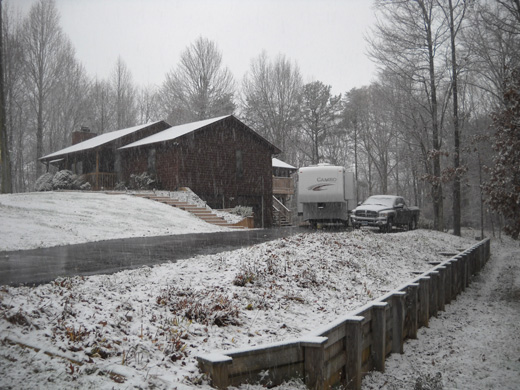
Oops; waited too long. Early December, 2010 snowfall
Last January we endured 9° F.
temps in southern Texas; all of our winter trips have had some sub-freezing
nights and rainy, miserable days, even in Phoenix's Sun Valley. In the summer we
sometimes find 90° temps
when we temporarily dip under 8,000 or 9,000 feet elevation in transit
to our next high-altitude destination.
Mother Nature can be very fickle. There is no perfect weather
venue in the continental United States so we just go with the flow.
We've got air conditioning and three different heating options in the
camper, several blankets, and clothing for a wide temperature range.
If we become full-timers we won't
need to go back East twice a year to attend
to the house and yard. That will not only save on fuel costs, it will
also give us even more freedom to roam in search of eternal
spring weather.
THE GOOD, THE BAD, AND THE UGLY
In my web entries I tend to highlight mostly the positive things about
our RV lifestyle -- sunny photos of scenic places, fabulous
trails to run and hike, interesting people we meet, spacious
campgrounds, our comfortable little home on wheels . . .
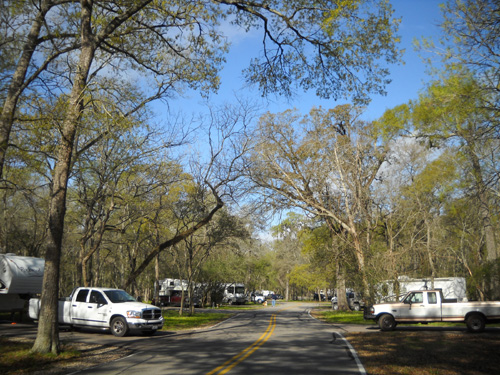
The campground at Brazos Bend State Park south of
Houston, TX
is very popular with RVers during spring break.
(March, 2010)
That's because I'm basically an optimist. I'm one of those
lemonade-from-lemons kind of people. And since I retired I have conscientiously tried
to become less of a perfectionist Type A personality and
more of a laid-back Type B.
It's working.
Negative stuff rolls off my back more easily now than it used to. If the
weather's crappy and I don't feel like going outside, I enjoy spending
more time writing or reading inside. When I get behind on this website,
I don't obsess about it. If something goes wrong with the
truck or camper, I figure Jim-the-mechanic-extraordinaire will soon have
it fixed -- or we'll find someone who can. When we can't get a
reservation at a particular campground when we want it, I know we can find
viable alternatives.
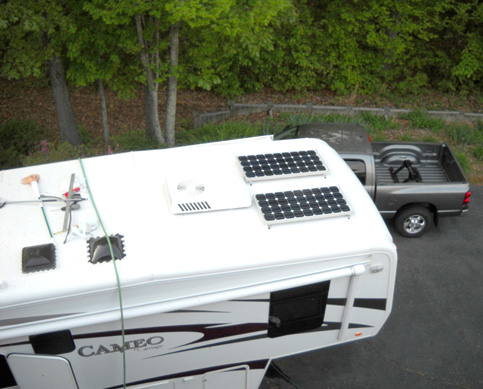
Jim installed these solar panels on our last
two campers and rigged up the generator, inverter,
charger, controller, and wiring
in the front basement. He took this photo from the roof of
our house last spring. Click
here
for a web entry he wrote about the entire system.
You get the idea.
I can attribute much of my change in reactions to life's annoyances to
our more relaxed RV lifestyle. We have few deadlines and little
structure. Unless there's a genuine emergency, I respond more calmly now
than I would have five or ten years ago.
Jim's still mostly Type A and worries more about things than I do.
Sometimes he gets frustrated with my
mellow responses to Things That Go Wrong and my lack of desire to plan
out every detail like I used to do. For example, he is more comfortable with a definite itinerary
than I am and likes to make campground reservations as soon as we have a
tentative plan, even if we end up canceling or modifying them later on.
(I'm fine with having a Plan B and C, though.)

Jim cleans the roof of the Cameo at our house in VA
last fall.
Jim also feels more pressure because he's the one with the skills to do
the repairs and maintenance on the vehicles, not me. He gets stuck with
more of that work than I do.
Consequently,
he periodically reminds me to tell people that RVing isn't all fun and
games. ☺
Too often for our liking, Stuff Happens. When you travel or live in a
house on wheels it's inevitable that there will be weather and traffic problems, blown tires,
camper slides that won't slide back in, wayward GPS directions that send
you on RV-unfriendly roads,
campground reservation gotchas, obnoxious campground neighbors, and many
other things that can and do go wrong.
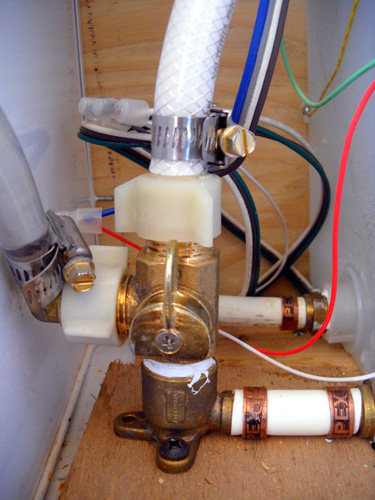
One of the latest repairs Jim made was putting in a
new valve to stop a leak from
the fresh water tank. Carriage is good about
sending us parts under warranty. That's
easier than taking it to an authorized repair
center when
Jim can do the work himself.
Despite all the downsides of traveling and living in a camper, however, we both
agree that our life is
much simpler in the Cameo
than in the house. No, it's not always glamorous or exciting but it's
less stressful and usually less expensive than owning a house -- especially one
that sits empty, thousands of miles away, for nine or ten months of the
year.
PREVIOUS RV-RELATED ENTRIES
Over the past six years this journal has been both a how-to manual and a
how-NOT-to manual (those cautionary tales, remember?) for both running
and RV traveling. We aren't running or RV experts but we
generously share ideas that have worked for us, warn you about some that
didn't, and occasionally address questions from readers in various
entries.
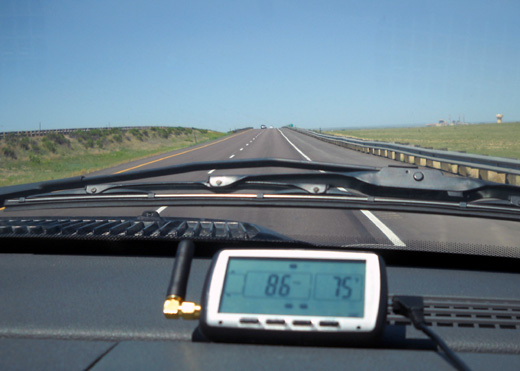
Tire pressure monitoring system: A Good Thing
to Have to avoid blown RV tires.
You'll find lots of travel and RVing information in our previous
journals. Just go to the
home page, click on the various years, and scan
the topics pages for each year.
Many folks aspire to a lifestyle like this when they retire, just as we
dreamed of it for many years.
In the next series of entries I'll focus on some things to consider if you dream
about traveling most or all of the time in an RV. There
are many variations of this lifestyle in addition to what I've
described about our own unique MO. I'll include examples
of how some of our equally-nomadic RVing friends and
acquaintances live.
Happy trails,
Sue
"Runtrails & Company" - Sue Norwood, Jim O'Neil,
and Cody the Ultra Lab
Previous
Next
© 2011 Sue Norwood and Jim O'Neil
